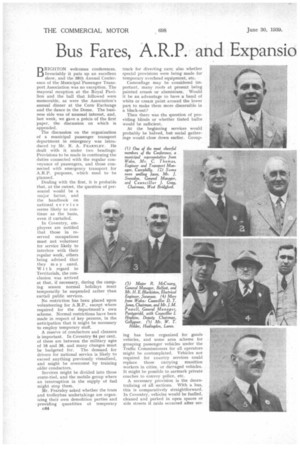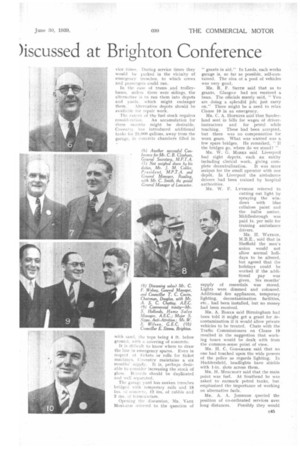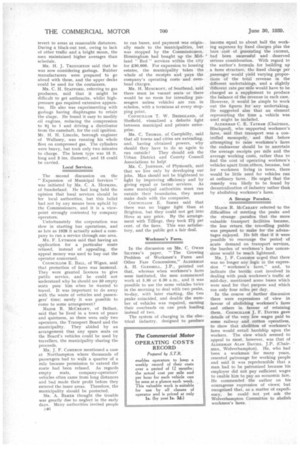Bus Fares, ARP. and Expansio )iscussed at Brighton Conference
Page 86

Page 87

Page 88

If you've noticed an error in this article please click here to report it so we can fix it.
BRIGHTON welcomes conferences. Invariably it puts up an excellent show, and the 38th Annual Conference of the Municipal Passenger Transport Association was no exception. The mayoral reception at the Royal Pavilion and the ball that followed were memorable, as were the Association's annual dinner at the Corn Exchange and the dance in the Dome. The business side was of unusual interest, and, last week, we gave a précis of the first paper, the discussion on which is appended.
The discussion on the organization of a municipal passenger transport department in emergency was intro(luced by Mr. R. A. FEARNLEY. He dealt with it under two headings: Provisions to be made in continuing the duties connected with the regular conveyance of passengers, and those connected with emergency transport for A.R.P. purposes, which need to be planned.
Dealing with the first, it is probable that, at the outset, the question of personnel would be a major factor, and the handbook on national service seems likely to continue as the basis, even if curtailed.
In Coventry, employees are notified that those in reserved occupations must not volunteer for service likely to interfere with their regular work, others being advised that they m a y enrol. With regard to Territorials, the conclusion was arrived at that, if necessary, during the camping season normal holidays must temporarily be suspended rather than curtail public services.
No restriction has been placed upon volunteering for A.R.P., except where required for the department's own scheme. Normal restrictions have been made in respect of key persons, in the anticipation that it might be necessary to employ temporary staff.
A reserve of conductors and cleaners is important. In Coventry 84 per cent. of these are between the military ages of 18 and 38, and many changes must be budgeted for. The demand for drivers for national service is likely to exceed anything previously visualized, and might be overcome by training older conductors.
Services might be divided into those route-tied, and the mobile group where an interruption in the supply of fuel might stop them. Mr. Fearnley asked whether the tram and trolleybus undertakings are organizing their own demolition parties and • providing quantities of temporary c44 track for diverting cars; also whether special provisions were being made for temporary overhead equipment, etc.
Camouflage may he considered important, many roofs at present being painted cream or aluminium. Would it be an advantage to have a band of white or cream paint around the lower part to make them more discernible in a black-out?
Then there was the question of providing blinds or whether tinted bulbs would be sufficient.
At the beginning services would probably be halved, but social gatherings would close down earlier. Group ing has been organized for goods vehicles, and some area scheme for grouping passenger vehicles under the Traffic Commissioners for all operators might be contemplated. Vehicles not required for country services could replace those carrying munition workers in cities, or damaged vehicles. It might be possible to earmark private coaches to convey police, etc.
A necessary provision is the decentralizing of all sections. With a bus, this is comparatively straightforward. In Coventry, vehicles would be fuelled, cleaned and parked in open spaces or side streets if raids occurred after ser vice times. During service times they would be parked in the vicinity of emergency trenches, to which crews and passengers could run.
In the case of trains and trolleybuses, unlessthere were sidings, the alternative is to run them into depots and yards, which might endanger
them. Alternative depots should be available for repair work.
The extent at the fuel stock requires consideration. An accumulation -for three months might be desirable. Coven+ rv has introduced additional tanks for 25,000 gallons, away from the garage, in concrete chambers filled in with sand, the tops tieing 4 ft. below ground, with a covering of concrete.
It is difficult to know where to draw the line in emergency spares. Even in respect ot tickets or rolls for ticket machines, Coventry maintains a six months' supply. It is, perhaps desirable to consider increasing the stock of glass. Records should be duplicated and well separated.
The garage yard has sunken trenches bridged with temporary rails and 18 oi concretE, 12 ins, of rubble and 2 ins. of tnrmacadam.
Opening the discussion, MR. VANE MORLAND referred to the question of " grants in aid." In Leeds, each works garage is, so far as possible, self-contained. The Idea of a pool of vehicles was very good.
MR. R. F. SMITH said that as to grants, Glasgow had not received a bean. The officials merely said, " You are doing a splendid job; just carry on," There might be a need to relax Clause 19 in an emergency.
MR. C. A. HoPiu8s said that Sunderland sent in bills for wages of driverinstructors and for petrol while teaching. These had been accepted, but there was no compensation for worn gears. What was wanted was a few spare bridges. He remarked, " If the bridges go, where do we stand? "
MR. W. G. MARKS said Liverpool had eight depots, each an entity including clerical work, giving com
plete decentralization. It was more serious for the small operator with one dept. In Liverpool the ambulance drivers had been trained by hospital authorities.
MR. %V. F. LYTEIGOE referred to cutting out light by spraying the windows with blue cellulose paint and the bulbs amber. Middlesbrough was paid Is. per mile for training ambulance drivers.
MR. H. WATSON, M.B.E., said that in Sheffield the men's union would not allow normal holidays to be altered, but agreed that the holidays could be worked if the additional pay was given. Six months' supply of essentials was stored. Lights were dimmed and coloured. Additional fire appliances, temporary lighting, decontamination facilities, etc., had been installed, but no money had been received.
MR. A. BAKER said Birmingham had been told it might get a grant for decontamination if it would allow private vehicles to be treated. Chats with the Traffic Commissioners on Clause 19 resulted in the suggestion that working hours would he dealt with from the common-sense point of view.
MR. H. C. GODSMARK said that no one had touched upon the wide powers of the police as regards lighting. In Huddersfield, headlights have shields with I-in. slots across them.
MR. H. MUSCROFT said that the main point was fuel. At Southend he was asked to earmark petrol tanks, but emphasized the importance of working on alternative fuels.
MR. A. A. JOHNSON queried the position of co-ordinated services over
long distances. Possibly they would revert to areas at reasonable distances. During a black-out test, owing to lack of other traffic and a bright moon, the men maintained higher averages than schedule.
MR. H. J. TROUGHTON said that he was now considering gasbags. Rubber manufacturers were prepared to go ahead with these, and the upper decks could be used for the containers.
MR. C. H. STAFFORD, referring to gas producers, said that it might be difficult to get anthracite, whilst highpressure gas required extensive apparatus. He also was experimenting with gasbags having diaphragms to retain the shape. He found it easy to modify oil engines, reducing the compression to 434 to 1 and driving a distributor from the camshaft, for the coil ignition. Mr. H. H. Lincoln, borough engineer of Wallasey, was running his whole fleet on compressed gas. The cylinders were heavy, but took only two minutes to charge. The latest type was 15 ft. long and 3 ins, diameter, and 15 could be carried.
Local Services.
The second discussion on the " Expansion of Municipal Services " was initiated by MR. C. A. HopiciNs, of Sunderland. He had long held the opinion that local services should be for local authorities, but this belief had not by any means been uphild by the Commissioners, and it is a viewpoint strongly contested by company operators.
Unfortunately the corporation was slow in starting bus operations, and as late as 1928 it actually asked a company to run a service through one area.
MR. F. LYTHGOE said that having an application for a particular route refused, instead of appealing, the appeal money was used to buy out the operator concerned.
COUNCILLOR E. BALL, of Wigan, said that protection of fares was immoral. They were granted licences to give public service, and he could not understand why he should see 50 empty seats pass. him when he *anted to travel. It was important to do away with the waste of vehicles and passengers' time; surely it was possible to come to some arrangement?
MAJOR R. MCCREARY, Of Belfast, said that he lived in a town of peace and quietness, as there were only two operators, the Transport Board and the municipality. They abided by an arrangement that any spare seats on the Board's vehicles could be used by travellers, the municipality sharing the proceeds.
MR. J. F. CAMERON mentioned a case at Northampton where thousands of passengers had to walk a quarter of a mile because permission to extend the route had been refused. As regards empty seats, company-operators' vehicles often came from long distances and had made their profit before they entered the inner areas. Therefore, the municipality should be protected.
Ms. A. BAKER thought the trouble was greatly due to neglect in the early days. Many authorities invited people
c46 to run buses, and payment was originally made to the municipalities, but was stopped by the Commissioners. Birmingham had bought up the Midland " Red " services within the city for £30,000. For expansion to housing estates, the municipality takes the whole of the receipts and pays the company's operating costs and overhead charges.
MR. H. MUSCROFT, of Southend, said there must be vacant seats or there would be no room for intending passengers unless vehicles are run in echelon, with a terminus at every stopping point.
COUNCILLOR T. W. BRIDGLAND, Of Sheffield, visualized a definite fight between municipal and private enterprise.
MR. C. THOMAS, Of Caerphilly, said that all towns and cities are extending, and, having obtained powers, why should they have to do so again to
run outside? They should ask the Urban District and County Council Associations to help'.
MR. C. JOHNSON, of Plymouth, said that we live only by developing our jobs. Man should not be frightened to fight by improving efficiency and by giving equal or better services. As some municipal authorities must run outside their boundaries, they must make deals with the companies.
COUNCILLOR E. SIMMS said that there was no bigger fight than at Brighton, but they could not get into Hove at any price. By the arrangement with Tillings, they took 274 per cent, of the fares. This was satisfactory, and the public got a fair deal.
Workmen's Fares.
In the discussion on MR. C. OWEN SILVERS'S paper, "The Growing Problem of Workmen's Fares and Other Fare Concessions," ALDERMAN A. H. GLEDHILL, J.P., pointed out that, whereas when workmen's fares were instituted, the men commenced work at 5.30 or 6.30 a.m., and it was possible to use the same vehicles twice in the morning to deal with two peaks, to-day, with later starting, the two peaks coincided, and double the number of vehicles was required, earning their overheads on one peak loading instead of two.
The system of charging in the electrical industry, designed to produce
income equal to about. half the working expenses by fixed charges plus the bare cost of generating the current, ` had been successful and deserved serious consideration. With regard to the author's formula for building up a fares structure, the fixed charge per passenger would yield varying proportions of the total revenue in the different undertakings, and a slightly different rate per mile would have to be charged as a supplement to produce the balance of the revenue in each case. However, it would be simple to work out the figures for any undertaking. He suggested also that an element representing the time a vehicle was used might be included.
ALDERMAN C. E. TATHAM (Chairman, Blackpool), who supported workmen's fares, said that transport was a controlled monopoly, and that before attempting to raise workmen's fares the endeavour should be to ascertain the average receipts per mile and the average working costs, rather than to find the cost of operating workmen's vehicles apart from others, because, but for workmen living in town, there would be little need for vehicles run at ordinary fares. He urged that the remedy was likely to be found by decentralization of industry rather than by abolishing workmen's fares.
A Strange Paradox.
MAJOR R. MCCREARY referred • to the difficulties of meeting the peaks and the strange paradox that the more valuable transport facilities became, the less return the travelling public was prepared to make for the advantages enjoyed. He felt that if it were possible to rearrange the period of acute demand on transport services, the burden of workmen's fare concessions would be much lightened.
MR. J. F. CAMERON urged that there was no longer any logic in the expression "workmen's fares," and, to indicate the terrific cost involved in dealing with peak workmen's traffic at mid-day, mentioned some buses which were used for that purpose and which ran only four miles per day.
In the course of further discussion there were expressions of view in favour of abolishing workmen's fares and others in favour of retaining them. COUNCILLOR J. F. DAVIES gave details of the very low wages paid to some railway and cotton operatives. to show that abolition of workmen's fares would entail hardship upon the workers. The view which seemed to appeal to most, however, was that of ALDERMAN ALAN DAVIES, J.P. (Chairman, Wolverhampton). He, who had been a workman for many years, resented patronage for working people and said it was reprehensible that a man had to be patronized because his employer did not pay sufficient wages to enable him to pay an economic fare. He commended the author on his courageous expression of views; but recognized that, as a matter of expediency, he could not yet ask the Wolverhampton Committee to abolish workmen's fares.




































































































































